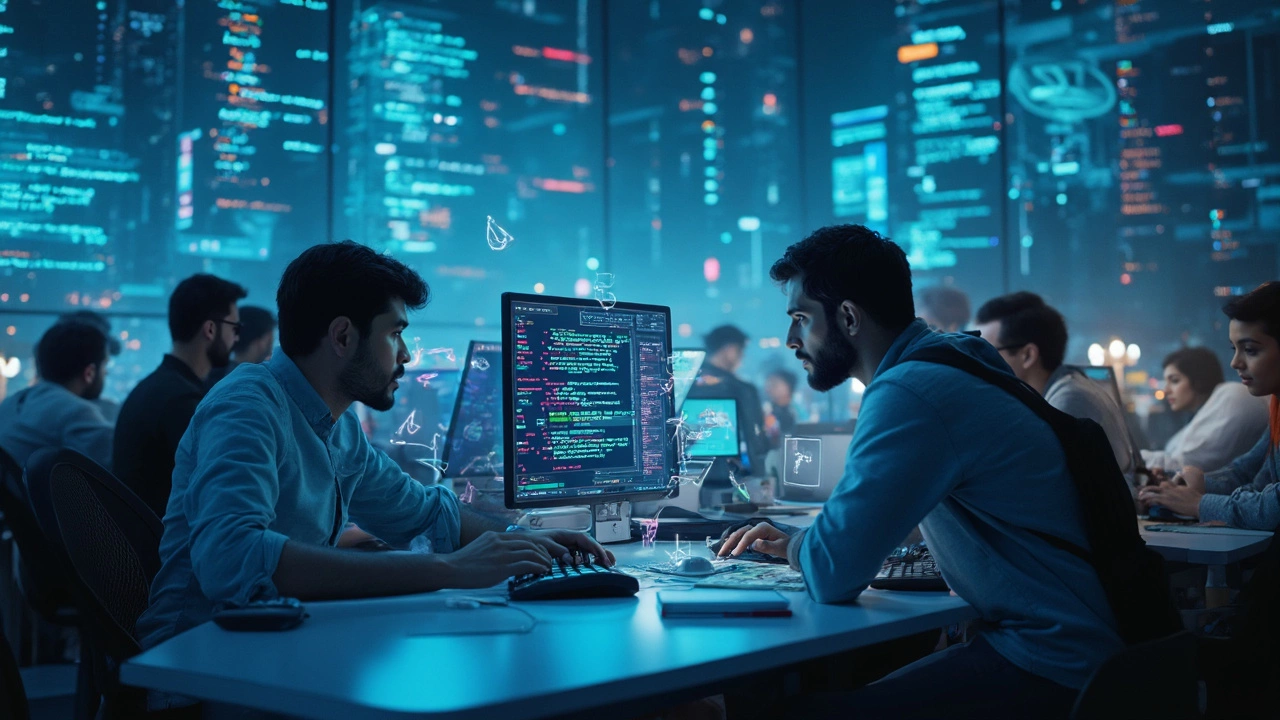Ever wondered if coding and programming are just different words for the same thing? You're not alone. Even in the tech world, these terms get tossed around interchangeably, which can be confusing if you're just starting to explore this digital landscape.
Let's break it down. Coding is like the backbone of the tech world. It's the process of transforming ideas into a language that computers can understand, think of it like writing a recipe in a computerized language. It’s about writing and creating instructions for tech systems to follow.
Programming, on the other hand, is a bigger umbrella. It includes coding but goes further. Programming involves planning out a full software structure and making sure the whole system works as a cohesive unit. It's more about solving problems and designing solutions.
Understanding Coding
Let's unravel coding. At its core, coding is all about writing instructions for computers in a special language they understand. Ever heard of languages like Python, Java, or C++? These are the tools coders use. Where humans speak English or Spanish, computers 'speak' these programming languages.
What Coders Actually Do
A coder's main job is to write code that performs specific tasks. This could be anything from displaying a simple greeting on a website to handling complex algorithms that predict weather patterns. It's about turning human thoughts into detailed tasks that a computer can execute.
Key Characteristics of Coding
- Specificity: Code needs to be precise. Even a small error—a missing semicolon or a wrong bracket—can cause the whole thing to break.
- Syntax: Just like grammar rules in English, coding languages have syntax that you must follow to make the computers understand what you want them to do.
- Tools: Becoming good with coding also means being handy with code editors and development environments like VS Code or Eclipse, which help you catch errors and manage your code better.
Here’s a fun tidbit: did you know that the first person to write a piece of code was a woman named Ada Lovelace back in the 1840s? Talk about pioneering tech before it was mainstream!
Why Coding Matters
Coding is essential because it’s at the heart of creating software applications. Whether it's mobile apps, video games, or even the web pages you browse daily, coding is what brings these digital experiences to life.
In today’s tech-savvy world, understanding coding can open doors to countless opportunities. It’s a skill that's not just for tech professionals anymore. With coding classes popping up everywhere, from online courses to neighborhood tech hubs, it's never been easier to start learning coding and demystify the process.
Defining Programming
Programming is like piecing together a massive puzzle using a mixture of logic, creativity, and command over coding languages. Unlike coding, which focuses on writing specific lines of a code, programming is the art and science of creating a complete, functioning software system.
When we talk about programming, we dive into an extensive process. It starts with laying out the plan or blueprint of what the software should achieve. The programmer not only writes the code but also tests, debugs, and maintains the program over time.
Bringing Concepts to Life
At its core, programming involves taking a problem, breaking it down into separate parts, and then developing a step-by-step solution using coding. Imagine building a house. Programming is like the entire construction process - from planning to laying the bricks, ensuring the plumbing works, and finally decorating.
- Design: Before any code is written, a programmer needs a clear understanding of what the project should accomplish.
- Development: This is where the actual coding happens, creating the algorithms and writing the code needed.
- Testing: Once the coding is done, it's time for rigorous testing to catch bugs.
- Maintenance: After a program is up and running, it requires updates and tweaks to keep it functioning smoothly.
What's fascinating is that programming has resulted in the creation of some of the most transformative technologies. For instance, video games, mobile apps, and web applications come into existence through programming's blend of creativity and technical skill.
| Year | Developers Worldwide |
|---|---|
| 2020 | 25.2 Million |
| 2025 | Projected 28.7 Million |
As technology progresses, the demand for skilled programmers will only grow, offering exciting opportunities for those entering the field. So, next time you hear someone talk about programming, you'll know it's much more than just writing code - it's about bringing big ideas to life.

Key Differences
Dive a bit deeper into the world of coding and programming, and you'll see they don't just do the same job. They're parts of the same puzzle, but each plays a special role. Let's break down what sets them apart.
Focus and Scope
Coding is like the hands-on part of the job. You're writing out the lines of code that a computer will follow. It's straightforward in some ways, focusing on syntax and getting each line 'just right' so your commands are understood by machines.
Programming looks at the bigger picture. It's less about individual lines and more about the entire workflow and system. You're not just writing code but designing, testing, troubleshooting, and more. It’s all about building a whole working system.
Problem Solving vs. Syntax
With coding, you're mainly about learning the syntax and writing the commands. It's more like learning a new language where you focus on grammar and structure.
With programming, you need a strategy to solve problems. You’re building the logic to ensure each part of your project works smoothly together.
Tools of the Trade
Coders often use text editors and a variety of coding languages like Python, JavaScript, or HTML. They focus on writing effective commands with these tools.
Programmers might use advanced tools like IDEs (Integrated Development Environments) that streamline various aspects of development, debugging, and testing to handle the overall project efficiently.
Real World Example
Imagine building a house. Coding is like laying bricks. Each brick needs careful placement and order. Programming, however, is like designing the blueprint and ensuring every door, window, and electrical outlet is in the right place and functions as needed.
Practical Tips
Diving into the world of coding and programming can feel overwhelming, but a few practical tips can set you on the right path.
Start with the Right Language
If you're just getting into coding, start with a language that’s beginner-friendly. Python is a solid choice because it's intuitive and has a gentle learning curve.
Utilize Online Resources
The internet is packed with resources. Websites like Codecademy and freeCodeCamp offer free tutorials to practice coding daily, which really boosts confidence.
Practice, Practice, Practice
The more you code, the better you get. Set aside dedicated time each day to write code. It doesn’t have to be hours—consistent 30-minute sessions add up.
Work on Projects
The best way to understand programming is to create something. Start by building simple projects like a to-do app or a personal website. This practice helps reinforce concepts and gives a sense of achievement.
Join a Community
Being part of a community can be incredibly motivating. Websites like Stack Overflow or GitHub can connect you with others. Plus, you can find mentors willing to share their knowledge.
Don’t Fear Mistakes
Mistakes aren't setbacks; they're learning moments. Debugging and figuring out why the code doesn't work is an essential part of the programming process. Embrace those head-scratching moments.
| Resource | Type | Link |
|---|---|---|
| Codecademy | Interactive Platform | Visit Site |
| freeCodeCamp | Online Tutorials | Visit Site |
